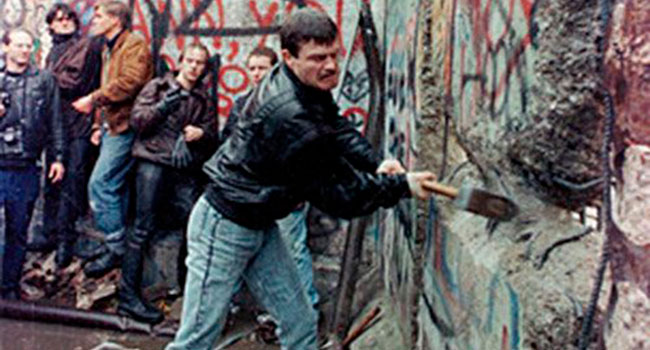 The relationship between Ronald Reagan and Mikhail Gorbachev has been described as “among the most remarkable forged by any two world leaders in modern history.” And one of its most famous public moments occurred just 30 years ago.
The relationship between Ronald Reagan and Mikhail Gorbachev has been described as “among the most remarkable forged by any two world leaders in modern history.” And one of its most famous public moments occurred just 30 years ago.
Speaking in front of the infamous Berlin Wall on June 12, 1987, Reagan issued a challenge: “Mr. Gorbachev, tear down this wall!”
Although subsequent events have imbued that speech with iconic status, lots of important people weren’t impressed at the time. Both the New York Times and the Washington Post gave the story relatively short shrift, consigning it to the inside pages.
It wasn’t Reagan’s first public musing on the subject. He spoke about it in Bonn, Germany, in 1985, and returned to the topic again in a 1986 German newspaper interview.
However, sophisticated opinion saw him as swimming against the tide. Or to be less kind, it was another example of how he was detached from reality.
Indeed, as Romesh Ratnesar related the story in his 2009 book Tear Down This Wall, many important figures in Reagan’s administration didn’t want the challenge to be included in the speech. And the efforts to prevent it continued right up until the morning of June 12.
The speech’s primary author was Peter Robinson, a young New Yorker who’d been hired in 1982 without, as he put it, “ever having written a speech in my life.” But despite his lack of experience, Robinson understood one essential thing: if he was going to write for Reagan, he needed to immerse himself in who Reagan was.
So he spent five years “really studying one human being – the way his mind worked, everything from his mannerisms to his policy decisions, from the low to the high. By the time I wrote the speech, I’d had five years of watching that guy very closely.”
Robinson attributes the speech’s central idea to a dinner conversation with a German woman named Ingeborg Elz. On a trip to Europe with the advance team, he attended a Berlin party hosted by the Elzes, at which Reagan’s impending visit was a topic of conversation.
After the discussion had gone on for a while, the hostess got to the point: “If this man Gorbachev is serious with his talk of perestroika and glasnost, he can prove it. He can get rid of this wall.” Robinson instantly knew he had his theme.
But when the White House speechwriting team met with Reagan on May 18 to go over the plans for the European trip, Robinson was a little disappointed.
The guy assigned the Rome speech, Josh Gilder, struck gold. Reagan spoke eloquently about what he wanted to say, practically dictating the speech to Gilder, who “took notes as fast as I could.”
Robinson didn’t get the same effusive reaction. Asked what he thought of the pre-submitted Berlin draft, Reagan said he liked it. And pressed further, he said he liked the passage about “tearing down the wall.” But as far as feedback was concerned, that was it.
Between May 18 and June 12, various administration heavyweights – including deputy national security adviser Colin Powell, secretary of state George Shultz, and chief of staff Howard Baker – pitched in to get the passage excised or changed. Their objections ran the gamut. It was unpresidential, unrealistic and too provocative.
Reagan, however, wouldn’t budge.
En route from Venice to Berlin on the morning of June 12, Reagan did his preparation, “breaking down the speech into groups of phrases, underlining the words he intended to emphasize, using slashes to mark pauses in the delivery.” It was time for the performer to take over.
Afterwards, informed opinion was lukewarm.
National security adviser Frank Carlucci remembers thinking, “It’s a great speech line. But it’ll never happen.”
And while acknowledging Reagan’s performance as “very effective,” American diplomat Henry Kissinger added “they won’t tear down the wall.”
Then, 29 months later, the seemingly impossible happened. The Berlin Wall came down.
Of course, it would be silly to argue that this was a direct consequence of Reagan’s speech. He certainly never made any such claim.
Still, from his 1982 “ash heap of history” address through to the denouement of the Cold War, Reagan demonstrated an unusually prescient sense of the Soviet Union’s fragility.
Mind you, his critics will say he was just lucky.
Troy Media columnist Pat Murphy casts a history buff’s eye at the goings-on in our world. Never cynical – well perhaps a little bit.
For interview requests, click here.
The opinions expressed by our columnists and contributors are theirs alone and do not inherently or expressly reflect the views of our publication.
© Troy Media
Troy Media is an editorial content provider to media outlets and its own hosted community news outlets across Canada.

